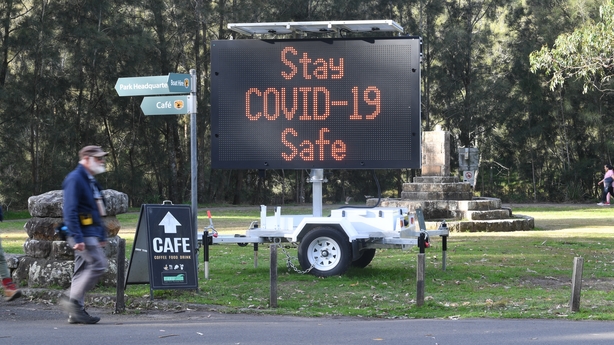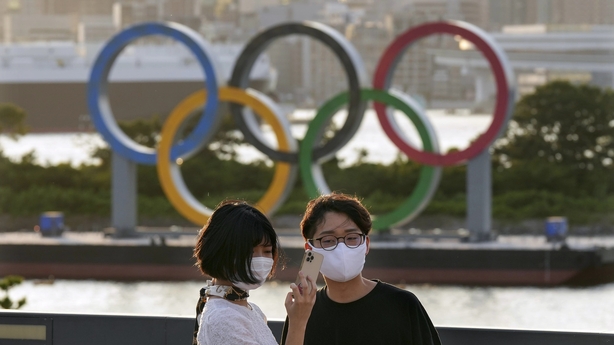France will enforce new legislation from next month that will make a health pass compulsory to visit a cafe, board a plane or travel on an inter-city train, a government spokesman has said.
The legislation passed by parliament at the weekend has sparked mass protests in France but the government is determined to press ahead and make the health pass a key part of the fight against Covid-19.
A valid health pass is generated by two jabs from a recognised vaccine, a negative coronavirus test or a recent recovery from infection.
The legislation also makes vaccination compulsory for health-workers and carers.
The pass has already been obligatory from 21 July for visits to museums, cinemas and cultural venues with a capacity of more than 50 people.
Government spokesman Gabriel Attal said it would also be obligatory in cafes, restaurants, flights and inter-city trains from 9 August.
Rising infections driven by the Delta variant, with an average of 19,000 daily cases - 97% higher than a week ago - means that the health situation in France "is continuing to get worse and remains worrying", he added.
Mr Attal's announcement came as data showed 50% of France's adult population were now vaccinated with two jabs.
The government's health pass strategy makes vaccination its number-one weapon in the fight against Covid-19.
Norway again postpones end to Covid-19 lockdown
Norway has postponed for a second time a planned final step in the reopening of its economy from pandemic lockdown, due to the continued spread of the Delta variant.
"A new assessment will be made in mid-August," Health Minister Bent Hoeie told a news conference.
Measures that will be kept in place to halt the spread of Covid-19 include bars and restaurants being limited to table service and limits of 20 people on gatherings in private homes.
The government in April launched a four-step plan to gradually remove most pandemic restrictions and had completed the first three of those steps by mid-June.
On 5 July, Prime Minister Erna Solberg said the fourth step could come in late July or early August at the earliest because of concerns about the Delta variant.
About 80% of adults in Norway have received a first dose of a Covid-19 vaccine and 41% of adults are fully vaccinated, according to the Norwegian Institute of Public Health.
Thanks to an early lockdown in March 2020 and tight restrictions that followed, the nation of 5.4 million people has seen one of Europe's lowest rates of mortality from the virus.
800 Norwegians have died from Covid-19.
Sydney lockdown is extended by four weeks
Millions of Sydney residents will spend another month in lockdown, authorities have announced, citing a still-fast-growing coronavirus outbreak and stubbornly low vaccination rates.
Australia's biggest city had been due to exit five weeks of lockdown on 30 July, but the restrictions will now remain in place until 28 August as case numbers continued to climb.
"I appreciate personally what we're asking people do for the next four weeks but it is because we want to keep our community safe and want to make sure we can bounce back as quickly as possible," New South Wales state premier Gladys Berejiklian said.
Officials announced 177 new cases linked to the Sydney outbreak, which began mid-June when a driver for an international flight crew contracted the virus.
People living in hotspots have been urged not to leave their neighbourhoods, but those living alone will be allowed to create a "singles bubble" with another person.

During the lockdown, Sydney residents can leave their homes only for exercise, essential work, shop for necessities such as food, and medical reasons.
In recent weeks, police have doled out fines to those violating the restrictions.
Ms Berejiklian said police would step up compliance efforts, while imploring Sydneysiders to report others breaking the rules.
"We really need people to do the right thing at all times. Do not let your guard down," she said.
The announcement came as Melbourne awoke to the end of its fifth virus lockdown, after beating the Delta variant for the second time in recent months.
It was a victory won through "determination and hard work", according to Victoria state premier Dan Andrews.
About 13% of Australians have been vaccinated, with low supplies of Pfizer-BioNTech shots and scepticism about the AstraZeneca jab slowing the rollout.
The country has recorded more than 33,000 infections and 921 Covid-related deaths in a population of 25 million.
Record virus cases in Tokyo
Daily virus cases in Tokyo topped 3,000 for the first time today, as several neighbouring regions weighed emergency restrictions to tackle a surge in infections.
Tokyo, which is already under a virus state of emergency as it hosts the Olympics, reported 3,117 cases, and Governor Yuriko Koike called on people to avoid "unnecessary, non-urgent outings."
Japan's vaccination programme started slowly, and only just over 25% of the population has had two jabs.
"I want young people to get vaccinated. Young people's behaviour is the key. I'm asking them please for their cooperation," Ms Koike said.
Japan has seen a comparatively small coronavirus outbreak, with around 15,000 deaths despite avoiding harsh lockdowns.

The state of emergency in place in Tokyo mostly limits bar and restaurant opening hours and bans them from selling alcohol, though experts have warned compliance is dropping and cases are surging among young people.
Cases are also rising elsewhere, and three regions surrounding Tokyo -- Chiba, Saitama and Kanagawa -- are now considering seeking a virus emergency from the national government.
The spike in cases is likely to increase scrutiny of the Olympic Games, with persistent concerns over whether the event could drive infections.
Olympic participants face various restrictions, including regular testing and limits on their movement.
And 124,358 tests of Olympic athletes and team officials this month revealed just 22 confirmed positive cases, according to Tokyo 2020 organisers. The figure does not include tests at airports.
Government spokesman Katsunobu Kato called on Japanese to avoid meeting and drinking in groups, suggesting people "watch the Olympic Games at home".
Fans are barred from almost all Olympic venues, though people have been showing up at competitions on public roads.
Israel to offer vaccines to 5-11-year-olds with serious health complications
Children in Israel aged five to 11 at risk of serious health complications can be vaccinated against Covid-19 as of 1 August, Israeli health officials said on Wednesday.
The Israeli health ministry gave the green light for the vaccinations to children who are "at significant risk of serious illness or death" from coronavirus.
"This is a special authorisation, and each vaccination will be studied on a case-by-case basis," a ministry spokesperson said.
The health ministry yesterday issued a list of medical problems where a vaccination was advised.
They include children with brain, heart or lung problems, severe immunosuppression, sickle cell anaemia, pulmonary hypertension and severe obesity.
They will be offered a Pfizer/BioNTech dose of 0.1 millilitre, three times less than the standard vaccine.
Last month, health officials extended vaccination to children aged 12 to 16.
About 55% of Israel's population has been double vaccinated with Pfizer-BioNTech, thanks to a massive campaign launched in late December after an agreement with the pharmaceutical giant.
Its initial vaccine rollout of the jab was among the world's fastest and case numbers dropped dramatically.
In early June Israel eased many restrictions but soon after, as cases rose, the health ministry re-imposed a requirement for masks to be worn in enclosed public places.
The authorities have also announced a partial return to the "health pass" programme, where all events with more than 100 participants entry will be restricted to people who have been vaccinated, recovered from the virus or have had a recent negative test.

